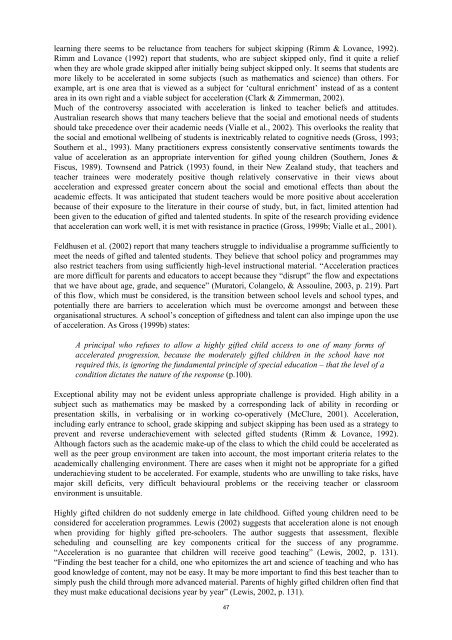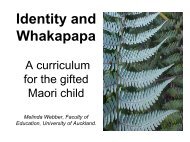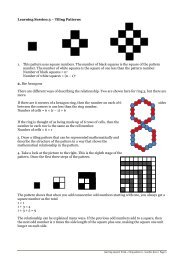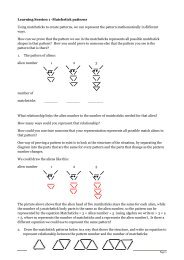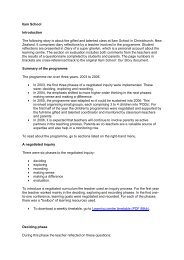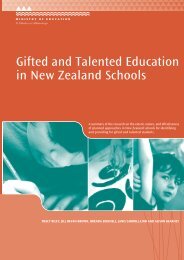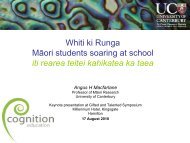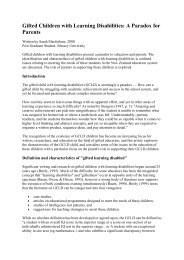The Extent, Nature and Effectiveness of Planned Approaches in ...
The Extent, Nature and Effectiveness of Planned Approaches in ...
The Extent, Nature and Effectiveness of Planned Approaches in ...
You also want an ePaper? Increase the reach of your titles
YUMPU automatically turns print PDFs into web optimized ePapers that Google loves.
learn<strong>in</strong>g there seems to be reluctance from teachers for subject skipp<strong>in</strong>g (Rimm & Lovance, 1992).Rimm <strong>and</strong> Lovance (1992) report that students, who are subject skipped only, f<strong>in</strong>d it quite a reliefwhen they are whole grade skipped after <strong>in</strong>itially be<strong>in</strong>g subject skipped only. It seems that students aremore likely to be accelerated <strong>in</strong> some subjects (such as mathematics <strong>and</strong> science) than others. Forexample, art is one area that is viewed as a subject for ‘cultural enrichment’ <strong>in</strong>stead <strong>of</strong> as a contentarea <strong>in</strong> its own right <strong>and</strong> a viable subject for acceleration (Clark & Zimmerman, 2002).Much <strong>of</strong> the controversy associated with acceleration is l<strong>in</strong>ked to teacher beliefs <strong>and</strong> attitudes.Australian research shows that many teachers believe that the social <strong>and</strong> emotional needs <strong>of</strong> studentsshould take precedence over their academic needs (Vialle et al., 2002). This overlooks the reality thatthe social <strong>and</strong> emotional wellbe<strong>in</strong>g <strong>of</strong> students is <strong>in</strong>extricably related to cognitive needs (Gross, 1993;Southern et al., 1993). Many practitioners express consistently conservative sentiments towards thevalue <strong>of</strong> acceleration as an appropriate <strong>in</strong>tervention for gifted young children (Southern, Jones &Fiscus, 1989). Townsend <strong>and</strong> Patrick (1993) found, <strong>in</strong> their New Zeal<strong>and</strong> study, that teachers <strong>and</strong>teacher tra<strong>in</strong>ees were moderately positive though relatively conservative <strong>in</strong> their views aboutacceleration <strong>and</strong> expressed greater concern about the social <strong>and</strong> emotional effects than about theacademic effects. It was anticipated that student teachers would be more positive about accelerationbecause <strong>of</strong> their exposure to the literature <strong>in</strong> their course <strong>of</strong> study, but, <strong>in</strong> fact, limited attention hadbeen given to the education <strong>of</strong> gifted <strong>and</strong> talented students. In spite <strong>of</strong> the research provid<strong>in</strong>g evidencethat acceleration can work well, it is met with resistance <strong>in</strong> practice (Gross, 1999b; Vialle et al., 2001).Feldhusen et al. (2002) report that many teachers struggle to <strong>in</strong>dividualise a programme sufficiently tomeet the needs <strong>of</strong> gifted <strong>and</strong> talented students. <strong>The</strong>y believe that school policy <strong>and</strong> programmes mayalso restrict teachers from us<strong>in</strong>g sufficiently high-level <strong>in</strong>structional material. “Acceleration practicesare more difficult for parents <strong>and</strong> educators to accept because they “disrupt” the flow <strong>and</strong> expectationsthat we have about age, grade, <strong>and</strong> sequence” (Muratori, Colangelo, & Assoul<strong>in</strong>e, 2003, p. 219). Part<strong>of</strong> this flow, which must be considered, is the transition between school levels <strong>and</strong> school types, <strong>and</strong>potentially there are barriers to acceleration which must be overcome amongst <strong>and</strong> between theseorganisational structures. A school’s conception <strong>of</strong> giftedness <strong>and</strong> talent can also imp<strong>in</strong>ge upon the use<strong>of</strong> acceleration. As Gross (1999b) states:A pr<strong>in</strong>cipal who refuses to allow a highly gifted child access to one <strong>of</strong> many forms <strong>of</strong>accelerated progression, because the moderately gifted children <strong>in</strong> the school have notrequired this, is ignor<strong>in</strong>g the fundamental pr<strong>in</strong>ciple <strong>of</strong> special education – that the level <strong>of</strong> acondition dictates the nature <strong>of</strong> the response (p.100).Exceptional ability may not be evident unless appropriate challenge is provided. High ability <strong>in</strong> asubject such as mathematics may be masked by a correspond<strong>in</strong>g lack <strong>of</strong> ability <strong>in</strong> record<strong>in</strong>g orpresentation skills, <strong>in</strong> verbalis<strong>in</strong>g or <strong>in</strong> work<strong>in</strong>g co-operatively (McClure, 2001). Acceleration,<strong>in</strong>clud<strong>in</strong>g early entrance to school, grade skipp<strong>in</strong>g <strong>and</strong> subject skipp<strong>in</strong>g has been used as a strategy toprevent <strong>and</strong> reverse underachievement with selected gifted students (Rimm & Lovance, 1992).Although factors such as the academic make-up <strong>of</strong> the class to which the child could be accelerated aswell as the peer group environment are taken <strong>in</strong>to account, the most important criteria relates to theacademically challeng<strong>in</strong>g environment. <strong>The</strong>re are cases when it might not be appropriate for a giftedunderachiev<strong>in</strong>g student to be accelerated. For example, students who are unwill<strong>in</strong>g to take risks, havemajor skill deficits, very difficult behavioural problems or the receiv<strong>in</strong>g teacher or classroomenvironment is unsuitable.Highly gifted children do not suddenly emerge <strong>in</strong> late childhood. Gifted young children need to beconsidered for acceleration programmes. Lewis (2002) suggests that acceleration alone is not enoughwhen provid<strong>in</strong>g for highly gifted pre-schoolers. <strong>The</strong> author suggests that assessment, flexibleschedul<strong>in</strong>g <strong>and</strong> counsell<strong>in</strong>g are key components critical for the success <strong>of</strong> any programme.“Acceleration is no guarantee that children will receive good teach<strong>in</strong>g” (Lewis, 2002, p. 131).“F<strong>in</strong>d<strong>in</strong>g the best teacher for a child, one who epitomizes the art <strong>and</strong> science <strong>of</strong> teach<strong>in</strong>g <strong>and</strong> who hasgood knowledge <strong>of</strong> content, may not be easy. It may be more important to f<strong>in</strong>d this best teacher than tosimply push the child through more advanced material. Parents <strong>of</strong> highly gifted children <strong>of</strong>ten f<strong>in</strong>d thatthey must make educational decisions year by year” (Lewis, 2002, p. 131).47


